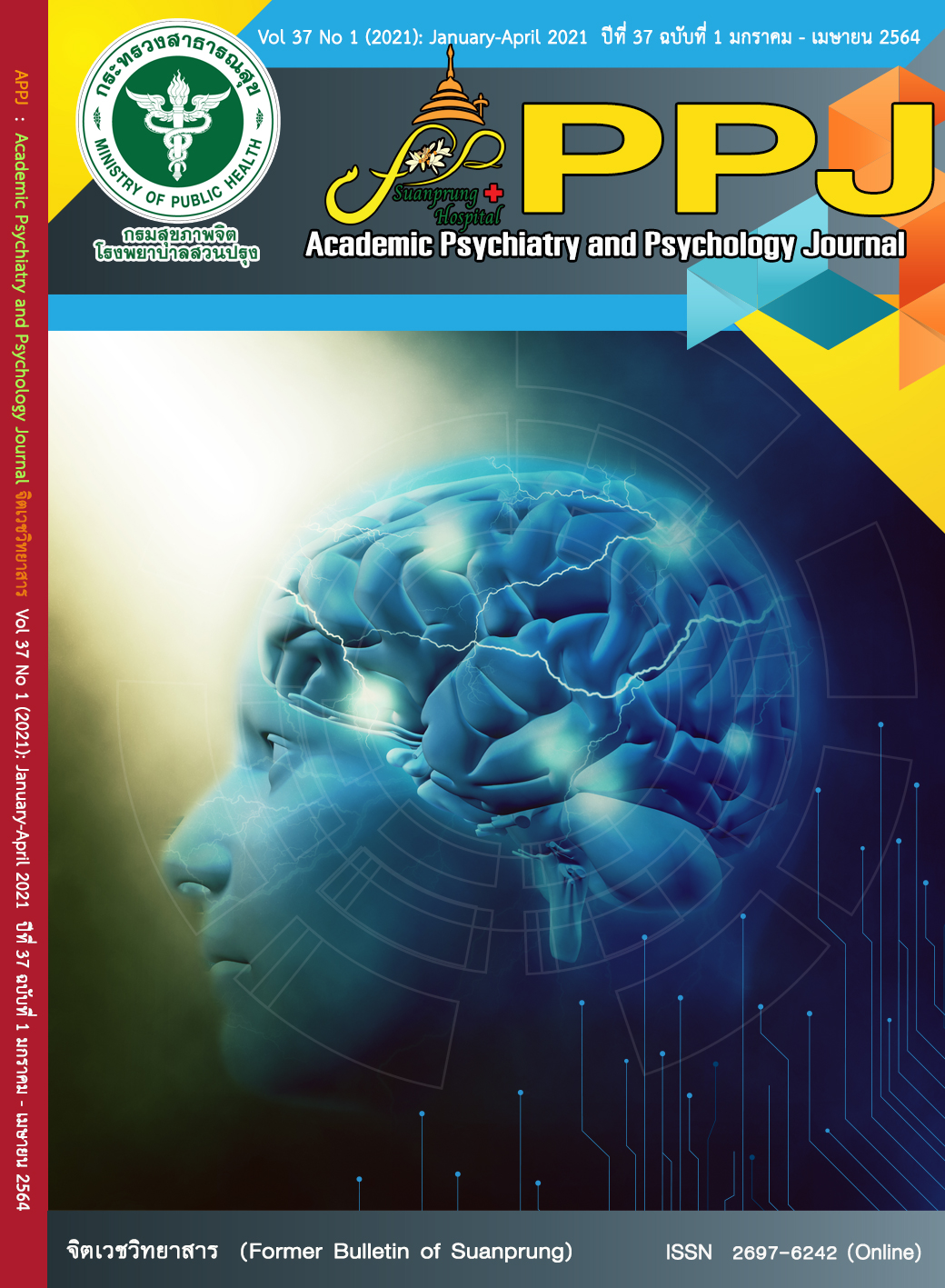Self-Efficacy of Opioids Dependent Patients on Retention in Methadone Maintenance Treatment
Main Article Content
Abstract
Objective: To study the self-efficacy of opioid-dependent patients retention in Methadone maintenance treatment at Fahmai Clinic, Thanyarak Chiang Mai Hospital.
Materials and Method: The Qualitative research study was investigated self-efficacy in four aspects 1) master experiences, 2) vicarious experience, 3) verbal persuasion, 4) Emotional Arousal. The study was conducted from May 2020 to June 2020. Twenty-one opioid-dependent patients who were on methadone maintenance treatment using the purposive sampling approach at Fah Mai Clinic. The data was collected through a personal interview survey, using a semi-structured interview. Descriptive statistics, including content analysis by classification and an issue summary, were used in order to analyze the data.
Results: Experience and difficulties during substance use and initiation of therapy were the impetus for retention in the treatment. The intimate relationship that has a direct influence on a daily basis, such as parents, spouses, friends are the most important in the decision-making process for obtaining the treatment. Verbal persuasion and resilience of family play the most crucial role in receiving methadone maintenance treatment. Additionally, negative experiences physically, and emotionally were great motivation for receiving and retention in the treatment.
Conclusion: Vicarious experience and verbal persuasion were important for the self-efficacy of opioid-dependent patients to retention in Methadone maintenance treatment
Article Details
บทความหลังผ่านการปรับแก้จากกองบรรณาธิการแล้ว เป็นลิขสิทธ์ของวารสารจิตเวชวิทยาสาร โรงพยาบาลสวนปรุง กรมสุขภาพจิต กระทรวงสาธารณสุข ห้ามเผยแพร่เพื่อประโยชน์ทางการค้าโดยไม่ได้รับอนุญาต แต่อนุญาตให้เผยแพร่บทความดังกล่าวเพื่อประโยชน์ทางการศึกษาแก่ประชาชนทั่วไป ทั้งนี้กองบรรณาธิการไม่จำเป็นต้องเห็นด้วยกับบทความหรือข้อคิดเห็นใดๆ ที่ปรากฏในวารสารสวนปรุง
References
United Nations Office on Drugs and Crime. World drug report 2018 [online]. 2018. Available from: https://www.unodc.org/wdr2018/prelaunch/WDR18_ Booklet_1_ EXSUM.pdf [2019 Nov 19]
National Health Security Office. NHSO Annual report Year 2018 [online]. Available from://http://eng.nhso.go.th/assets/portals/1/files/annual_report/Annual%20report_final%202018.pdf [2019 Nov 11].
Tanyarak Chiangmai Hospital. Statistical report 2019 [online]. 2019. Available from: http://tch.go.th/tch/public/index.php/statistical/read_file/12 [2019 Dec 8]
Ministry of Public Health. HARM REDUCTION [online]. 2017. Available from: https://opdc.moph.go.th/uploads/manual/part/ncmc_moph/9.แนวทางการดำเนินการลดอันตรายจากยาเสพติด%20(Harm%20Reduction).pdf [2019 Nov 11].
Office of The Narcotics Control Board Ministry of Justice. Opium cultivation and eradication report for Thailand 2014 – 2015 [online]. 2018. Available from: https:// www.oncb.go.th/OpiumReport/รายงานการสำรวจฝิ่นประจำปี%202557-2558.pdf [2019 Dec 19].
Bandura A. Social learning theory [online]. 1977. Available from://http://www. asecib.ase.ro/mps/Bandura_SocialLearningTheory.pdf [2019 Nov 8].
Pichai S. Textbook of addiction medicine. Bangkok: The Institute; 2006.
Priyapachara C. Family and community reaction affecting drug addicts [M.A. thesis]. Songkhla: Prince of Songkhla University; 2003.
Office of the Narcotics Control Board. ONCB Plan 2019 [online]. 2019. Available from://https://www.oncb.go.th/Home/PublishingImages/Pages/ProgramsandActivities/%E0%B9%81%E0%B8%9C%E0%B8%99%E0%B8%81%E0%B8%B2%E0%B8%A3%E0%B8%94%E0%B8%B3%E0%B9%80%E0%B8%99%E0%B8%B4%E0%B8%99%E0%B8%87%E0%B8%B2%E0%B8%99%E0%B8%9B%E0%B8%A3%E0%B8%B0%E0%B8%88%E0%B8%B3%E0%B8%9B%E0%B8%B5%202562.pdf [2019 Nov 15]
Royal Thai Navy Organization . Nursing handbook for health promotion and prevention. Samut Prakan: Division of Preventive Medicine; 2008.
Tanyarak MaeHongSon Hospital. Treatment for opioids dependent in drug therapy [online]. 2018. Available from:// https://www.tyrkk.go.th/web/uploads/ck/files/คู่มือบำบัด%20กลุ่มติด.pdf [2019 Nov 19]
Juraipon S. Factors related to self-efficacy for amphetamine relapse prevention among male adolescents, Government Drug Abuse Treatment Centers [online]. 2016. Available from://https://he01.tci-thaijo.org/index.php/jnat-ned/article/download/ 127005/95890. [2019 Dec 19].
McKellar J, Ilgen M, Moos BS, et al. Predictors of changes in alcohol-related self-efficacy over 16 years [online]. 2019. Available from: https://www.academia.edu/32654425/Predictors_of_changes_in_alcohol_related_self_efficacy_over_16_years. [2019 Nov 8].
Maisto SA, Roos CR, O’Sickey AJ, Kirouac M, Connors GJ, Tonigan JS, et al. The indirect effect of the therapeutic alliance and alcohol abstinence self-efficacy on alcohol use and alcohol-related problems in Project MATCH [online]. 2015. Available from: https://www.ncbi.nlm.nih.gov/pmc/articles/PMC4457319. [2019 Dec 19].
Puntong B, Kimsungnoen N. Effectiveness of self-efficacy and family support program on addiction behaviors in patients with amphetamine dependence in the National Institute of Drug Abuse Treatment. JHS. 2014;23(1):61-8. Retrieved from https://thaidj.org/index.php/JHS/article/view/614. [in Thai]

